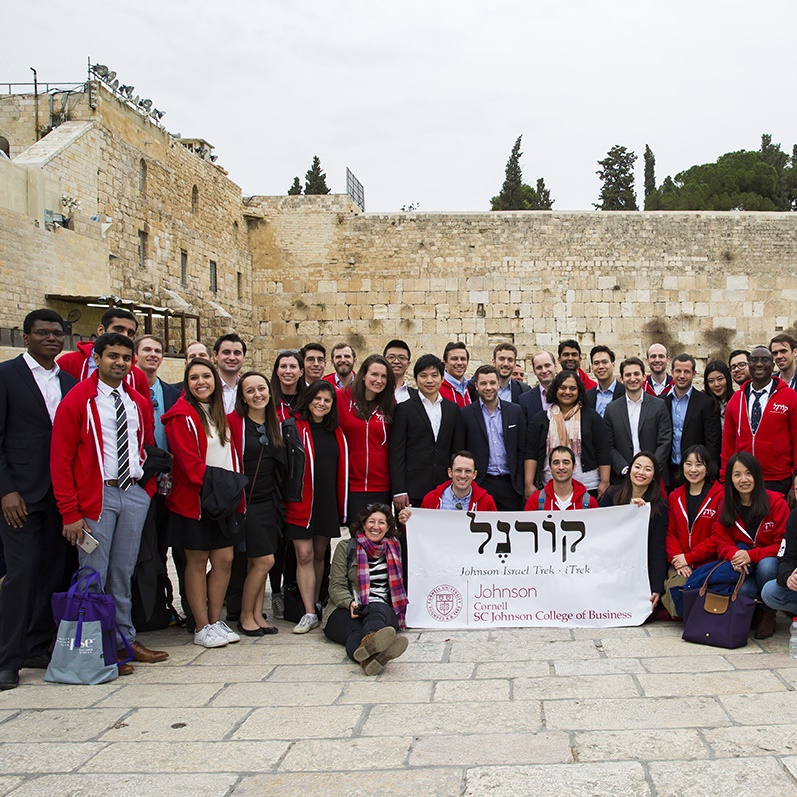Using Israel’s playbook to benefit African economies


by Armstrong Mbi, One-Year MBA ’18
As a country that makes international news headlines constantly, Israel is a major geopolitical force in the world. A visit to its business, political, and cultural ecosystems is an opportunity that every aspiring global leader should seize. As part of the Cornell itrek 2017 class, I not only participated in meetings with several startup founders, political and military leaders, and academics, but was also introduced to the broader cultural landscape through historic site visits as well as the nightlife – both in the city and the desert.
As an African (born and raised in Cameroon), I look forward to the day when countries will no longer be regarded as inferior based on economic, political, or social indicators. As such, when I visit another continent, I keep my eyes open to these factors. My question this time was “What page from Israel’s book can developing countries in Africa take?” By the end of my ten-day visit, my takeaway was that there are in fact several pages from Israel’s playbook that can benefit several African economies.
Necessity is really the mother of invention
Our first meeting with Miri Eisin, a former head of the combat intelligence corps and former international adviser to the prime minister, was meant to give us an overview of the geopolitical and regional security in the middle east. Israel’s history and position in the conflict-ridden Middle East positions its existence under constant threat of attack, which is mitigated by the Israeli Defense Forces (IDF), a military that is truly the “people’s army,” in my view. Subsequent speakers like Prof. Yisrael Aumann, the 2005 Noble Prize winner in Economics, explained the importance of the IDF using game theory – “You develop weapons, so as not to use them”. Created in 1948, the IDF is a cornerstone of the nation of Israel, serving as a melting pot for all its various ethnic groups, religions, gender and age groups. One of its unique traits is that both women and men are obligated to serve for at least two or three years respectively, with some exceptions due to religious affiliation.
As surprising as it was for me to see very young people in combat uniform – at times even in casual clothing walking the streets with automatic rifles – there is no doubt that the IDF is a strong part of the identity of the Israelis. The number of wars and conflicts Israel has engaged in makes it one of the best trained forces in the world. And yet, while security is the IDF’s main objective, another equally important role in Israeli society is its tutelage of different ethnic and socio-economic groups in the country. As a nation of immigrants, Israel’s population is diverse especially along religious and cultural lines. The IDF is an important institution within which individuals from various backgrounds study, work, and learn about one another. Another key insight is the IDF’s influence in the rapid technological growth in the country, including in tertiary education – whereby young people experience cutting-edge technology and are, in many cases, inspired to pursue STEM fields. This is a lesson that countries in Africa should heed in light of the ongoing challenges wrought by tribalism and culturalism. How do African countries, some of whom are home to over 200 tribal languages and cultures (as is the case with Cameroon), unite their citizenry, as well as provide the technologic skills required of today’s youth? Perhaps a model similar to the IDF could address this.
Oil is the past, technology is the new frontier
For most, the first thought that comes to mind when they think of the Middle East is oil, with several countries in the region such as Saudi Arabia, Iraq, and UAE among the highest oil exporting countries in the world. Israel, on the other hand, does not export or produce oil. During our trip, a presentation by Karnit Flug, the governor of the Bank of Israel, which discussed Israel’s economic strengths and weaknesses, highlighted the tech sector as one of the core growth areas of the economy. With a population of about 8 million people, there were 589 Startups in 2017, compared to 520 in Nigeria, which has a population of 190 million, for instance. Among the several startups with whom we had the opportunity to meet, discussions with the following companies were the highlights of my trip;
Mobileye – A tech company that develops vision-based advanced driver assistance systems for warning collision prevention. It was recently acquired by Intel for $15.3 billion.
EToro – A social trading network that offers a platform through which members can trade selected financial instruments using the power of social networking.
Alpha Omega – A medical device company in the field of neurosurgery that manufactures electrodes used in the suppression of Parkinson’s disease. It is greatly involved in community programs with the aim of developing future tech leaders in the Nazareth area.
The Israeli government has made deliberate efforts to grow the tech industry. For example, in our meeting with Nir Barkat, the Mayor of Jerusalem, he noted that a top priority of his government’s agenda was to foster growth in the tech sector through investments in STEM education and providing a conducive atmosphere for entrepreneurs. Programs such as these are reflected in the national education levels with about 49% of the population having a tertiary education, which is one of the highest among the OECD countries. Additionally, a developed venture capital ecosystem and funding from larger markets like the United States further serve the entrepreneurship ecosystem in Israel.
Educational investments in STEM are the foundations of the fourth industrial revolution, and Israel is one of the countries that is leading the way. This again is another lesson that developing countries can learn from Israel by making similar investments in their economies to avoid falling behind in this century. By the end of my trip, I walked away with a better understanding of the nation of Israel, its culture, and business environment; a perspective often not highlighted in the international news headlines. I saw a nation that sees its people as its greatest assets and is investing in them.
